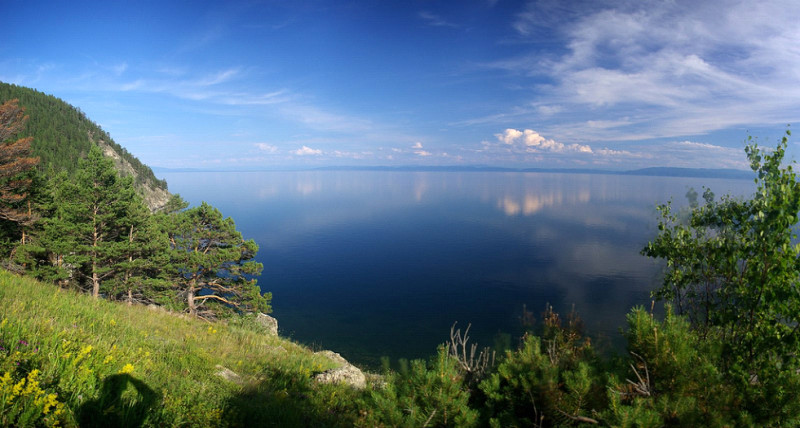 In 2011, Sylvain Tesson left his home in Paris for a 6 month stay, on his own, on the edge of Lake Baikal. He stayed in an old geologist’s hut that was heated by a cast-iron stove and attempted to lead a “simple life and claim back time”.
In 2011, Sylvain Tesson left his home in Paris for a 6 month stay, on his own, on the edge of Lake Baikal. He stayed in an old geologist’s hut that was heated by a cast-iron stove and attempted to lead a “simple life and claim back time”.
Lake Baikal in Siberia is the largest freshwater lake by volume in the world and contains nearly 20% of the world’s unfrozen surface freshwater. The lake is a Unesco World Heritage Site and is 395 miles long, 49 miles wide, 1,642m (just over a mile) deep, and 25 million years old. In fact, the lake is so huge that the surface area is as large as Belgium and, at normal walking speed, it would take you 4 months to walk all the way around it.
Off-grid living has the potential to become one of the most amazing experiences or life changing moments in one’s existence. However, if the destination is Lake Baikal, the chips are stacked against you. It is not the extreme environment or the wild and fierce creatures lurking in the dense wood that you will succumb to. It will be the extreme solitude, isolation and loneliness. One must mentally prepare for the marked change from the abundance of faces around you in the city, to the only face for miles and miles is that of your own reflection in the shimmering water.
https://www.theguardian.com/travel/2013/may/31/siberia-cabin-lake-baikal-russia. He was driven there by truck in February when the temperature was -30 degrees Celsius and the ice was a metre thick. It was a 6 day walk to the nearest village and a day’s walk to the nearest neighbour. His equipment included: “an axe and cleaver, fishing poles, kerosene lamp, ice drill, saw, snowshoes, tent, liquor glasses and vodka, cigars, provisions (pasta, rice, Tabasco sauce, coffee) and a library of almost 80 books”. Although his time in the Taiga was an experiment and not a complete emigration, Tesson still needed to account for and appreciate the enormity of the solitude he was facing out there.
“Cabin Fever” is an expression for a reason. Cooped up, alone in a hut for days on end can send someone into a spiral of depression. Tessson said that the pain derives from, “the sorrow of not sharing with a loved one the beauty of lived moments” and also “what others miss out on by not being with the person who experiences it”. Routine and remaining occupied are two ways to combat loneliness.
Tesson was warned prior to leaving Paris that boredom would become his worst enemy. He therefore decided to immerse himself in literature. With a library around him, he suddenly had an abundance of friends and stories to be listened to. His collection extended from philosophy and poetry, through to nature books, non-fiction and fiction. DH Lawrence would stir his senses. Nietzche and Schopenhauer would keep his mind active and Daniel Defoe was there for his unparalleled story-telling ability.
Tesson claims, the slowing down of time and the deathly quiet of his home allowed him to read sometimes for 8 hours straight and with the two luxuries he allowed himself (vodka and cigars), this sounds like an idyllic setting.
Daily routine meant that Sylvain didn’t have prolonged periods of time where he was left completely with his thoughts and a hundred yard stare. He divided his day in to two sections. Mornings were spent reading, writing, learning poetry, smoking and contemplating. The afternoon provided exercise. Fishing, running and chopping firewood would be the order of the day leading up to sunset. Ice skating on the lake was cited by Tesson as a particular highlight and also camping and hiking up in the titanic mountains that his cabin backed on to. Sylvain said that the way to stay sane is to go about your day the same as if you were surrounded by people in a city. Surprisingly, Tesson found enjoyment in the knowledge of what tomorrow would bring. The possibility of the unknown is exciting but it is also heart-warming to know that the next day will be filled with the same peace as today.
What is most interesting about Sylvain Tesson’s time spent at Lake Baikal, is the impression it left within him and what living off-grid did for him upon his return to civilisation. In contrast to the thought, “happiness is only real when shared”, Tesson believed that, “the only way to be free is to be alone”. The moment another person is added into the equation there is a danger of “coercion, compromise [and] imprisonment”. It is a hard life out in the Taiga, it will age you rapidly, but you are free and alive, not “languish[ing] in the city”.
Tesson, saw his 6 month excursion as a revolt. He paid no tax, owed nothing to any form of government, had no communication with home and paid no bills. Having no income affects the government; they gain nothing from you. This “should be the objective of true revolutionaries”, to become exempt from societal boundaries and forge a new way of life.
Upon returning home, Tesson argued that silence is “rejuvenating”. It made him appreciate the time he has within his day and how to use it wisely rather than rush about inefficiently. Loss of freedom begins the moment you can be contacted or looked up at the touch of a button. Tesson says, “throw out your mobile phone…take to the woods! Consolation awaits you there”.
Further information on journeying to Lake Baikal can be found in Peter Thomson book Sacred Sea: A Journey to Lake Baikal.